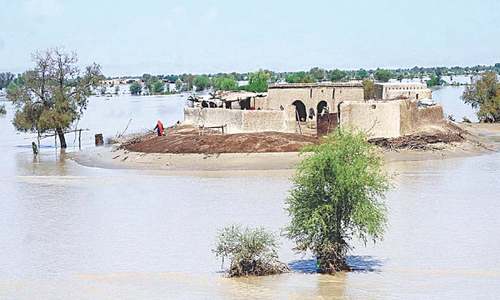DADU: People started picking up the pieces and returning to normalcy after devastating rains and flooding wreaked havoc in Kachho region, leaving a trail of death and destruction behind.
Affected villagers complained of “lukewarm response” by district administration towards marooned villagers who faced shortages of food items, medicines and safe drinking water.
Qasbo Gaj Road from Nai Gaaj Zero Point to Nai Gaaj Dam via Kakar has been restored after the rainwater dried up or receded but no relief goods or food and other essential items have been provided to hundreds of villages including Yameen Leghari, KT Sujawal, KT Wassan, Kurkli Leghari and Jummo Khan Leghari.
Villagers Mohammad Khan, Farooq Ahmed, Sultan Leghari and others told Dawn that the district administration appeared to be in deep slumber, allowing their women and children to fall prey to starvation.
A resident of Ghulam Mustafa Leghari village said that no one came to provide food and other essential goods to marooned people, many of whom had borne irreparable losses.
He demanded immediate restoration of road communication so that the marooned villagers could come out of the flooded villages and earn bread on a self-help basis.
Hundreds of families wait for food, water and other essential commodities
Renovation of Johi-Wahi Pandhi road was under way and the road from FP dyke to Kachho belt had been restored while the help of heavy machinery.
Engineer highways Fateh Mohammad Sannai said that the renovation work on the road would be completed very soon so as to restore road communication.
Similarly, main link roads leading to Johi-Chhini road and Tando Rahim road could not be opened yet and almost 50 villages which are still under two to four feet water remained cut off from each other.
A resident of Chhini, Sardar Rajab Khan Shahani, said that nothing had been done to drain out the stagnant rainwater and the district administration officials and other bureaucrats were visiting FP dyke only for photo session.
“The Dadu administration needs to work efficiently and need not pay mere visits just for cheap publicity,” he said.
A former nazim of UC Sawriyo, Allah Yar Rodhrani, said that hundreds of families in 50 villages in his union council were facing acute shortage of drinking water, food and medicines.
He said the rainwater in their areas had lowered or dried up, yet difficulties of inhabitants were not over yet.
Published in Dawn, August 13th, 2020
















































Dear visitor, the comments section is undergoing an overhaul and will return soon.